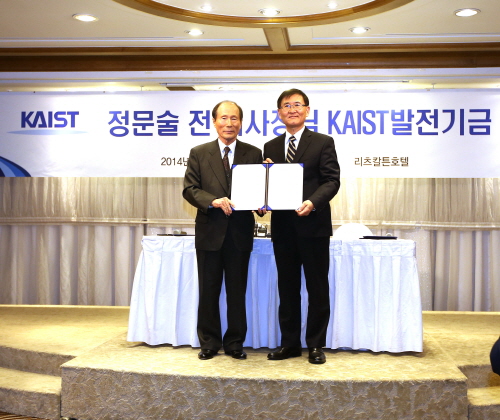fund
It was Chung's second contribution to KAIST—his first donation of USD 28 million in 2001 supported the construction of the Bio and Brain Engineering building, a major research center on campus where biotechnology and information technology converge.
Established in 2013, the KAIST Graduate School of Future Strategy consists of three interdisciplinary graduate programs on future strategy, intellectual property, and science journalism. The Research Center for Future Strategy is an affiliate of the graduate school. KAIST is the first Korean university that offers an academic program granting a degree in futures studies.
The rapid advancement in science and technology today affects, profoundly and extensively, all corners of global society from education, politics, economy, and environment to resources, sustainability, and inequality. As we live in a highly interconnected, digitalized, and unpredictable world, analyzing the events, trends, patterns, and changes of the past and present, developing foresight, and mapping preferred futures have become more relevant than ever.
KAIST utilizes its strong tech-knowledge base in science and engineering to offer students a high quality education and training in futures thinking, skills, and methodologies to develop foresight and to plan future strategies for international relations, business and industry, national defense, science and technology, and new media. KAIST also anticipates helping government, business, public service, and non-profit organizations identify important issues and develop long-range implementation strategies to prepare for probable and preferred futures.
Moon-Soul Chung (left), the former CEO of Mirae Inc., and President Steve Kang (right), holding together the donation agreement in Seoul, January 10th, 2014

-
research Image Analysis to Automatically Quantify Gender Bias in Movies
Many commercial films worldwide continue to express womanhood in a stereotypical manner, a recent study using image analysis showed. A KAIST research team developed a novel image analysis method for automatically quantifying the degree of gender bias in films. The ‘Bechdel Test’ has been the most representative and general method of evaluating gender bias in films. This test indicates the degree of gender bias in a film by measuring how active the presence of women is in a film. A
2019-10-17 -
policy MOU between KAIST and DTU Signed
KAIST and the Technical University of Denmark (DTU) signed a memorandum of understanding (MOU) to cooperate in the areas of startup, student exchange, and joint research on October 25, 2016 at the Embassy of Denmark in Seoul, Korea. Under the agreement, KAIST and DTU will exchange students and researchers through startup programs and continue to collaborating in education and research. The MOU was facilitated during the Green Growth Alliance Meeting and Energy Seminar hosted by the Danish embas
2016-10-27 -
people Professor Lee to Head the Addis Ababa Institute of Technology
Emeritus Professor In Lee of the Department of Aerospace Engineering at KAIST was appointed to the post of President of the Addis Ababa Institute of Technology (AAiT) in Ethiopia. His term will begin on August 1, 2016 and end on July 31, 2018, which can be extended up to five years. AAiT is an affiliated institute of Addis Ababa University, a distinguished national university in Ethiopia, and specializes in education and research in engineering and technology. There are currently 5,500 undergra
2016-08-03 -
people KAIST to Participate in Summer Davos Forum 2016 in China
A group of KAIST researchers will share their insights on the future and challenges of the current technological innovations impacting all aspects of society, while showcasing their research excellence in artificial intelligence and robotics. Scientific and technological breakthroughs are more important than ever as key agents to drive social, economic, and political changes and advancements in today’s world. The World Economic Forum (WEF), an international organization that provides one
2016-06-27 -
policy KAIST and McKinsey Korea Agreed to Cultivate Management Leaders
KAIST and McKinsey Korea signed a memorandum of understanding (MOU) for the “Joint Research on Innovative Instructional Method to Cultivate Future Management Leaders” on April 8, 2016, at the SUPEX Management Hall of KAIST Management School in Seoul. Under the MOU, both organizations will cooperate in the following research areas: management strategies to overcome the low growth of Korean economy, instructional methods to foster leaders in the field of business and management, and
2016-04-15